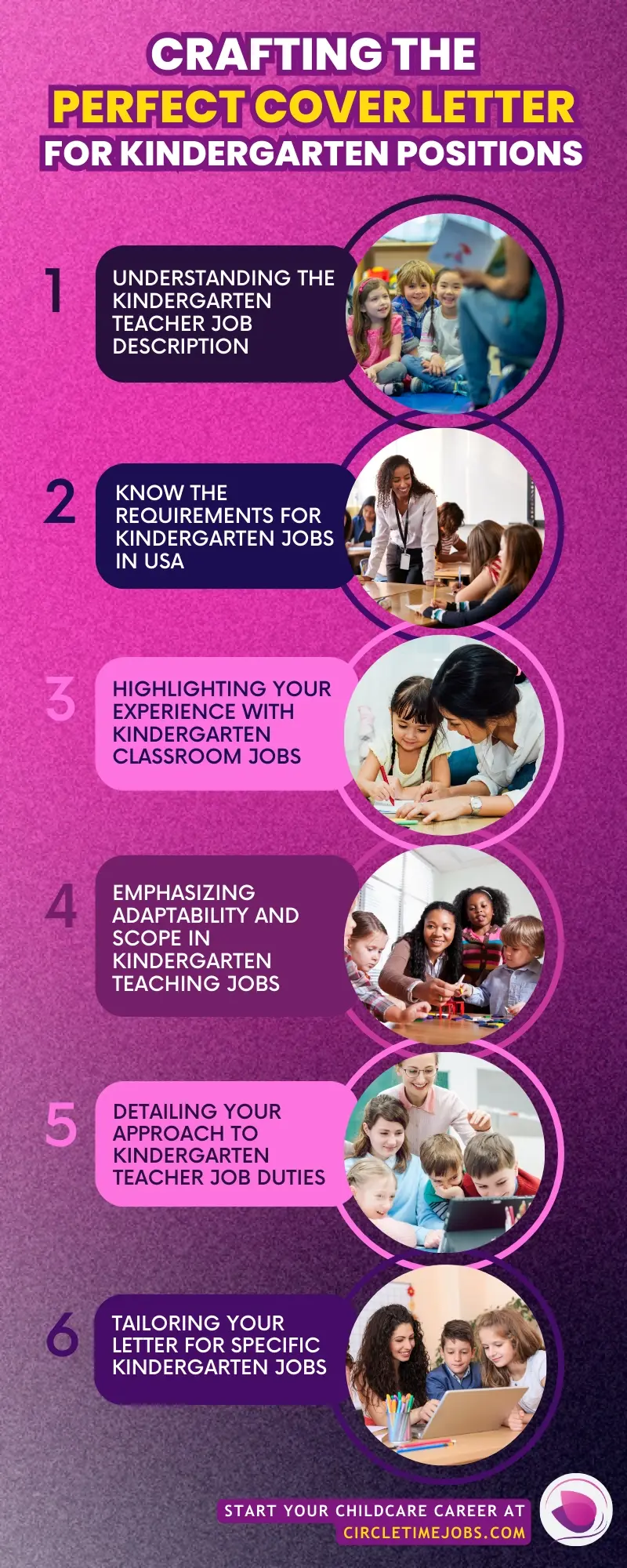
Crafting a Winning Cover Letter for Child Care Jobs: A Comprehensive Guide
Applying for kindergarten positions as a lead teacher, assistant, or another role within a kindergarten classroom demands a cover letter highlighting your passion, qualifications, and understanding of these jobs. From the broad scope of kindergarten teaching jobs to the specific duties associated with them, your cover letter should address how you fit into this vibrant educational landscape.

1. Understanding the Kindergarten Teacher Job Description
Understanding the job description of a kindergarten teacher in the USA is crucial for those aspiring to enter this foundational level of education. Kindergarten teachers in the U.S. are tasked with introducing young learners to the basics of subjects like reading, writing, math, and science in engaging and appropriate ways for their developmental stage. Beyond academic instruction, their role includes fostering social skills, such as sharing and teamwork, and emotional development, including self-regulation and empathy.
A crucial part of the job description also involves assessing student progress, adapting teaching methods to meet diverse learning needs, and maintaining open lines of communication with parents and caregivers. Additionally, kindergarten teachers are responsible for creating a safe, inclusive, and stimulating classroom environment that encourages curiosity and a love for learning. This comprehensive role demands creativity, patience, adaptability, and a deep understanding of early childhood development, making it a uniquely rewarding position in the educational landscape.
2. Requirements for kindergarten jobs in USA
In the United States, the requirements for securing kindergarten jobs vary by state but generally include a combination of educational background, certification, and skills. Typically, candidates must hold at least a Bachelor’s degree in Early Childhood Education or a related field. A teaching license or certification for early childhood education is required, which involves passing state-specific exams and completing a teacher preparation program.
Some states or districts might also need a master’s degree or additional credits in education. Beyond these formal prerequisites, successful kindergarten teachers often possess excellent communication skills, creativity in lesson planning, patience, and a deep understanding of child development. These requirements ensure that educators are well-prepared to foster a nurturing and effective learning environment for their young students.
3. Highlighting Your Experience with Kindergarten Classroom Jobs
Highlighting your experience with kindergarten classroom jobs involves showcasing your hands-on involvement in classroom management and student support. This may include describing your role in organizing and supervising classroom activities, facilitating small group sessions, or assisting the lead teacher in implementing curriculum plans. Emphasize any specific responsibilities you’ve undertaken, such as managing classroom routines, implementing behavior management strategies, or creating engaging learning materials.
Additionally, discuss your interactions with students, detailing how you’ve supported their needs, encouraged participation, and fostered a positive learning environment. Providing examples of collaborating with other staff members or engaging with parents to support student development demonstrates your competency in kindergarten classroom jobs. By highlighting your practical experience and contributions, you illustrate your readiness to excel in a kindergarten classroom setting.
4. Emphasizing Adaptability and Scope in Kindergarten Teaching Jobs
Emphasizing adaptability and scope in kindergarten teaching jobs highlights this critical role’s dynamic and expansive nature within the educational system. Kindergarten teachers must possess a high level of adaptability as they cater to young children’s varied learning styles, developmental stages, and emotional needs. This requires swiftly modifying lesson plans, teaching strategies, and classroom activities to ensure all students can engage with the material and thrive in a group learning environment.
Moreover, the scope of kindergarten teaching extends beyond traditional academic instruction. Teachers are also responsible for introducing children to the foundational concepts of behavior, social interaction, and emotional self-regulation. They play a pivotal role in shaping students’ first formal educational experiences, setting the tone for their future learning journey. This involves a blend of academic duties, from creating and implementing a curriculum that captivates young minds to managing classroom jobs that instill a sense of responsibility and community among students.
The adaptability and broad scope inherent in kindergarten teaching jobs underscores the complexity and significance of this position. Educators in this field must continually develop their skills and strategies to foster a nurturing, inclusive, and effective learning environment. By doing so, they lay down the foundational stones for lifelong learning, curiosity, and personal growth among their students.
5. Detailing Your Approach to Kindergarten Teacher Job Duties
Detailing your approach to kindergarten teacher job duties in a job application or interview involves clearly articulating your strategies for meeting the diverse needs of young learners. It means describing how you plan to engage children in foundational academic concepts through play-based learning, hands-on activities, and storytelling to spark curiosity and promote early literacy and numeracy skills. It also outlines your methods for creating a supportive and inclusive classroom environment that nurtures emotional and social development, such as through circle discussions or cooperative games.
Highlighting your commitment to differentiated instruction and showing how you adapt lessons to accommodate various learning styles and needs demonstrate your readiness for the role. Moreover, discussing your approach to communicating with parents and caregivers about their child’s progress and how they can support learning at home underscores your understanding of the partnership required in education. Overall, detailing your approach showcases your comprehensive knowledge of the kindergarten teacher’s job duties and your dedication to fostering a rich, supportive, and engaging early learning experience.
6. Tailoring Your Letter for Specific Kindergarten Jobs
Tailoring your letter for specific kindergarten jobs involves customizing your application to align with the unique needs and expectations of the position and school you’re applying to. Begin by researching the school’s mission, educational philosophy, and any specific initiatives or programs they offer. Use this information to demonstrate your understanding of their values and how your skills and experience complement their goals. When discussing your qualifications, emphasize relevant experiences that directly relate to the specific requirements or preferences outlined in the job posting.
For example, if the school emphasizes project-based learning, highlight your experience with hands-on, inquiry-based teaching methods. Additionally, address any specific classroom jobs or responsibilities mentioned in the job description and explain how you’re well-suited to fulfill those duties. By tailoring your letter this way, you show that you’ve taken the time to understand the school’s needs and are genuinely interested in contributing to their success.
Conclusion
A well-crafted cover letter for kindergarten positions is your first step toward landing your dream job in early childhood education. By carefully integrating keywords such as kindergarten teacher jobs, kindergarten classroom jobs, and kindergarten teacher job duties, you not only optimize your letter for potential ATS (Applicant Tracking Systems) but also clearly communicate your enthusiasm and qualifications for the role. Remember, whether you’re applying for a lead teacher role, a kindergarten teacher assistant job, or other classroom jobs in kindergarten, your cover letter is an invaluable tool to highlight your dedication to fostering a love of learning in the youngest students.


